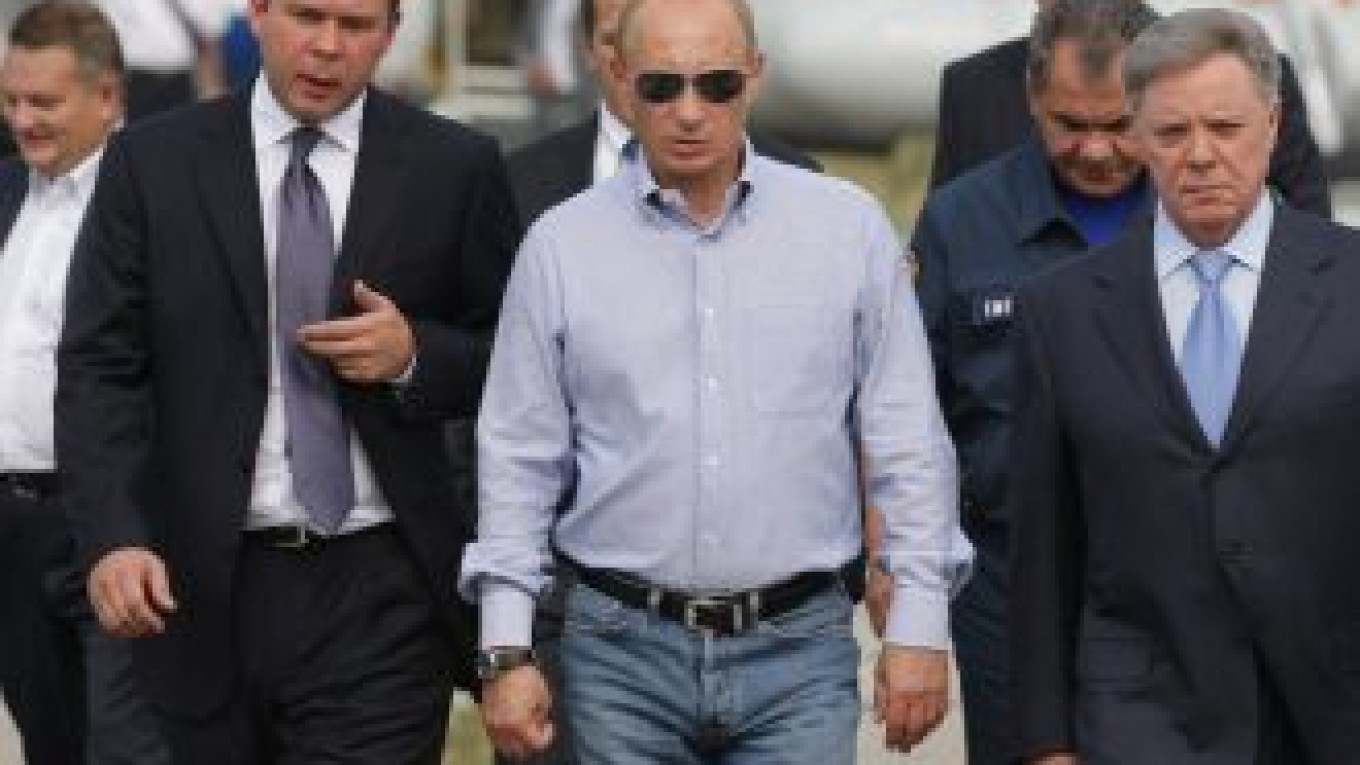Russia looked ready to exchange one natural disaster for another as cold winds swept across the country's northwest on Monday and weather forecasters said hurricane-like gales might replace wildfires and a two-month drought in central Russia.
Fierce winds left more than 1,500 settlements in the Leningrad, Novgorod, Pskov, Vologda and Tver regions without electricity late Sunday, emergency officials said.
The cold front hit the Central, Northwest and Volga federal districts overnight, and weather forecasters said it would reach Moscow and the Vladimir, Ivanovo and Nizhny Novgorod regions this week, ending a record heat wave that settled in central Russia in late June.
Moscow authorities issued a storm warning and placed emergency services on alert Monday.
Toxic smog that blanketed Moscow on Sunday cleared as the cold front approached the city.
The forest and peat fires that caused the smog are rapidly shrinking, covering a total area of 45,800 hectares countrywide on Monday compared with 53,500 a day earlier, the Emergency Situations Ministry said. Fires covered 46.6 hectares in the Moscow region, down from 60 hectares on Sunday, it said.
But environmentalists accused the ministry of underreporting.
"In reality, the number of woodland fires around Russia is three to four times higher than that reported by the officials," Alexei Yaroshenko, a forestry expert with Greenpeace Russia, told The Moscow Times.
In certain areas, like the Moscow region, the difference might be dozens of times higher, he added.
"Sometimes the difference is so big that it looks like the officials don't really understand what is happening and where," Yaroshenko said.
Prime Minister Vladimir Putin sought to deal with the aftermath of both the storms — he ordered the repair of damaged buildings — and the continuing wildfires on Monday.
Putin, who watched the flooding of a peatland area near the Moscow region town of Kolomna, called the wildfire situation in the region “unacceptable,” but said it could have been worse, the government's web site reported.
Putin said the Federal Forestry Agency had enough money to cope with the fires with an annual budget of 20 billion rubles ($655 million).
“These funds could have secured the desired result but didn't,” said Putin, who last week suggested that the Federal Forestry Agency, now subordinate to the Agriculture Ministry, be put under the direct control of the government.
The Cabinet is planning to allot another 300 million rubles ($9.8 million) to flood peatlands around Moscow.
Moscow region Governor Boris Gromov said earlier that the flooding program would take three to four years and cost 20 billion to 25 billion rubles.
Moscow's City Hall proposed Monday to amend the 2007 Forest Code to place Moscow region forests under the city's control.
"We are ready to draft amendments to improve the situation," said Leonid Bochin, Moscow’s land use and environment chief, Interfax reported. "The situation with 'Moscow's lungs' is in critical condition." The forests around the city are often referred to as Moscow's lungs.
Mayor Yury Luzhkov accused Moscow region authorities last week of not doing enough to prevent and fight the wildfires, which contributed to the city's smog.
Alexander Bedritsky, the Kremlin's weather adviser, told journalists Monday that experts were unable to predict whether the heat wave would return next year. But Bedritsky, who also serves as president of the World Meteorological Organization, said the heat wave and other climate-related disasters that took place worldwide this summer "are signs of global warming," Interfax reported.
A Message from The Moscow Times:
Dear readers,
We are facing unprecedented challenges. Russia's Prosecutor General's Office has designated The Moscow Times as an "undesirable" organization, criminalizing our work and putting our staff at risk of prosecution. This follows our earlier unjust labeling as a "foreign agent."
These actions are direct attempts to silence independent journalism in Russia. The authorities claim our work "discredits the decisions of the Russian leadership." We see things differently: we strive to provide accurate, unbiased reporting on Russia.
We, the journalists of The Moscow Times, refuse to be silenced. But to continue our work, we need your help.
Your support, no matter how small, makes a world of difference. If you can, please support us monthly starting from just $2. It's quick to set up, and every contribution makes a significant impact.
By supporting The Moscow Times, you're defending open, independent journalism in the face of repression. Thank you for standing with us.
Remind me later.






